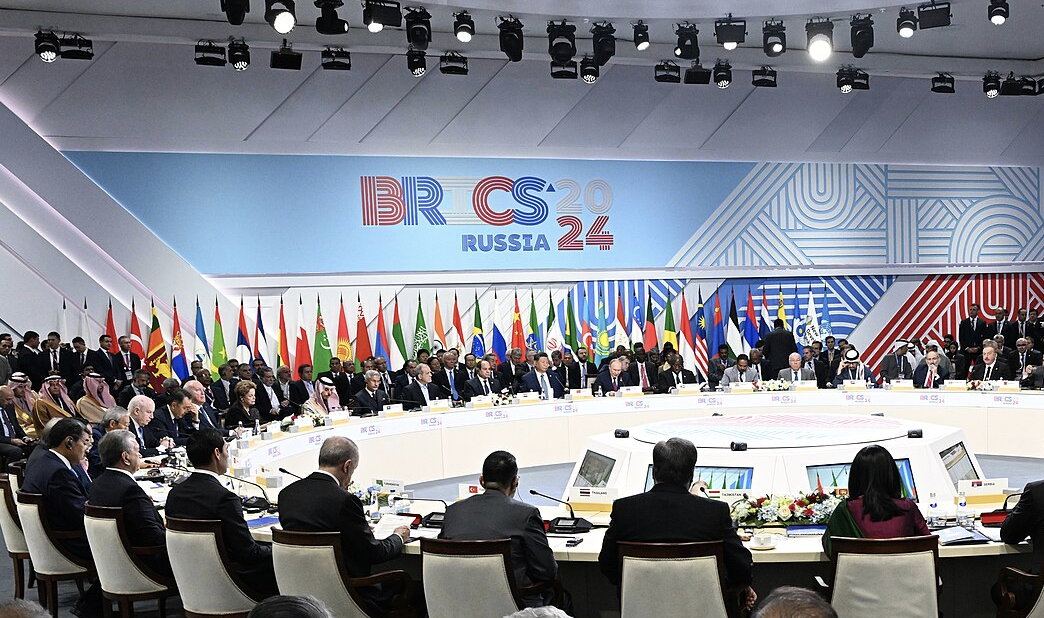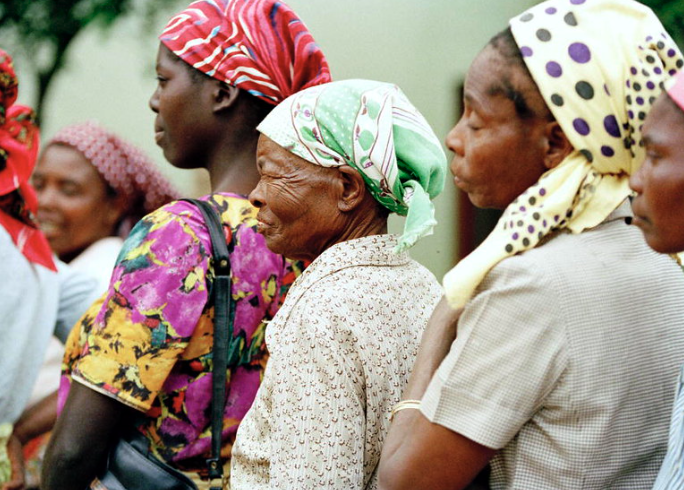News
Problems of Adolescence — Understanding South Africa’s Russia (and BRICS) Policy
South Africa’s attempts to sit at the top table (albeit one without two-thirds of the global economy present) have everything to do with Africa’s powerlessness or perceptions of weakness in the face of mounting challenges.

Former Director, The Brenthurst Foundation

Former Research Director, The Brenthurst Foundation

As Ukraine’s new foreign minister, Andrii Sybiha, visits South Africa, President Cyril Ramaphosa has fended off criticism that he went too far at last week’s BRICS summit in Kazan, Russia, where he described the country as a “valued ally” and failed to mention the invasion of Ukraine at all.
Ramaphosa is protesting too much. The real question is: What has South Africa gained after expending so much political capital buttering up Russia and its’ President, Vladimir Putin?
At the summit, Ramaphosa explained the Government of National Unity — clearly a foreign concept to Putin, who decides on his election results before polling day — and thanked the autocrat for his contribution to making South Africa the country it is today.
He failed to utter the word “Ukraine”, despite claiming to be an ardent advocate for peace between it and Russia, lest this upset Putin’s charm offensive.
Perhaps the value of this strange relationship between a leading democracy and a violent autocracy is clearer to the diminishing numbers of South Africans who were trained in Soviet military academies, which must today, number scarcely in the hundreds, if not double-digits. Even this romance is illogical since many of them were trained in Ukraine, not Russia, the country under threat by Vlad the Invader.
It might be clearer for the die-hard Leninists in the ranks of the SA Communist Party (SACP), the type who callously and readily stir up hatred for their own political ends. As Lenin — dead 100 years this week — infamously replied to Bertrand Russell, “We stirred up the poor peasants against the rich peasants and they soon hanged them from the nearest tree. Ha, ha, ha.”
But such a lack of humanity is not widespread in SA society, at least if the level of support for the SACP and its fellow travellers in the lunatic fringe, such as the EFF, is anything to go by.
It can’t be because of trade. South Africa trades less with Russia (shady arms transactions excluded) than it does with Angola. And apart from one notable manganese oligarch, there is little Russia-sourced investment in South Africa, at least of the sort that creates jobs outside the government.
The facts are well-known and public. As the below graphic published by Codera Analytics illustrates, Russia barely registers on our trade radar.
It can’t be because Russia (or China for that matter) are going to live up to the promise of changing the system of global governance in the United Nations, even though the utterly hapless UN secretary-general, António Guterres, pitched up to pay his respects at Putin’s summit in Kazan.
The problem with UN reform has as much to do with those outside the UN Security Council as with those five countries (including Russia and China) permanently within it. The notion is more than a little simplistic. It makes it seem as if the world outside of the Permanent Five (P5) in the Security Council is powerless, which it is not. It also makes it seem as if the P5, which includes Russia and China, is the stumbling block to UN reform, which it might be, but less so than the pretenders themselves.
It avoids the reality of UN operations, where the African members of the Security Council already have what is in practice an effective veto, including (indeed, especially) on African issues.
Multilateralism
It can’t be entirely because this era of globalisation and collaboration has failed in the manner that Ramaphosa spelt out in his Kazan speech.
“We meet at a time when multilateralism is under threat,” he said. “We see this 16th BRICS Summit as an opportunity to harness our collective strength to build a safer, more prosperous and equitable world… We will seek to mobilise the countries of the world to take practical steps to resolve global challenges while strengthening international cooperation within a rules-based system,” he added without any hint of irony, given the role of his hosts in Ukraine, or of China in Tibet and over Taiwan, or of Iran in fomenting the violence from Gaza to the Red Sea.
Moreover, the relative growth and peace of the “Global South” over the past 30 years has no precedent. This generation has seen the largest upliftment out of poverty in history. Why this has not happened in much of Africa has very little to do with global power structures or whether the dollar is the reserve currency (indeed, that may be an asset whose undoing could be very costly) or with the UN.
It can’t be (surely) because we support the invasion of smaller countries as a means of improving international security. The strategic cost of this misstep has been colossal, especially for Putin. Though his twisted mind might think Russia is a country with a glorious past ahead of it, even the hardest-boiled Russophile would have to realise that Putin has managed to make it a country with a brilliant future behind it.
Rather, South Africa’s attempts to sit at the top table (albeit one without two-thirds of the global economy present) have everything to do with Africa’s powerlessness or perceptions of weakness in the face of mounting challenges. BRICS is about the old game of externalising our problems rather than taking responsibility in the manner that real achievers have done.
Lee Hsien Loong, the former prime minister of Singapore, who stepped down this year, noted 20 years ago that while globalisation provided unprecedented opportunities, it also “restricts our degrees of freedom. Capital is mobile, seeking the best returns worldwide. Talent is also mobile, looking for opportunities globally and welcome in many countries. If a government sets policies that disregard the concerns of its constituents, the country will pay a heavy price.”
Future needs
To address this, Singapore constantly reinvents itself, not only focusing on meeting needs now, but also in the future. This has hinged on an ability to break down complex problems, encourage out-of-the-box thinking which is rooted in plausible realities, and, most importantly, by cultivating a “helicopter quality” among leaders to look over the horizon while still keeping an eye on the detail below. This requires the government to act as a catalyst for action, a pace-setter and a standard-bearer for excellence rather than an entity trying to seek excuses for dragging the world backwards.

To an extent, South Africa’s digression into the BRICS is the West’s doing. The retreat of the US (of which the resurgence of Donald Trump, the withdrawal from Afghanistan and the disengagement from global trade regimes can be taken as symptoms of the re-emergence of its isolationist streak) and the weakness of the EU (loss of competitiveness through overregulation, absurd green objectives) create the rhetorical space for the Global South and the feeling of change, even though the content of that change is unclear save for the axiomatic Ramaphosattitude that “In our quest for a more interconnected, just and prosperous world, we have the ability to foster an environment of peace through a focus on sustainable development.”
Yet the South is acting like what Lenin described as “useful idiots”, the term commonly used during the Cold War to portray those regarded as susceptible to communist propaganda and psychological manipulation. The changes China and Russia want will not benefit the South. That much is pretty clear.
The ANC’s central dogma is that the West exploits Africa. Adherence to this is the key objective over values, human rights, democracy or other stated goals. This is why we have slipped neatly into the company of China, Russia and India along with Brazil, Iran, Venezuela and others in that particular political and policy peloton.
As politically convenient and self-referential as this might be for the ANC and its ideological fellow travellers, this argument is fundamentally without substance, since the problem is not globalisation in Africa, but a lack of it.
This dogma also runs against what the South African electorate wants and wants now. They have, after all, sent a clear message to the ANC. It cannot win on promises alone.
The capital accumulated by Nelson Mandela and others during and immediately after the Struggle is being spent without much direction. When it starts to become scarcer (hints of no more Agoa, disinvitations to G7 meetings, the indefinite postponement of the EU-SA Summit) the cost will become apparent. Now there should be an incentive to preserve what remains, and invest long-term.
But to do that, the adolescents have to grow up or make way for others who actually place the country’s interests first.
This article originally appeared on the Daily Maverick
Photo: FMT

